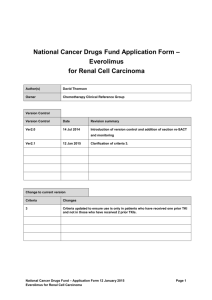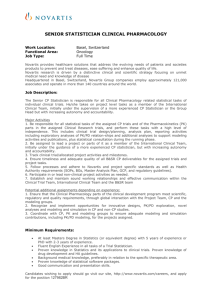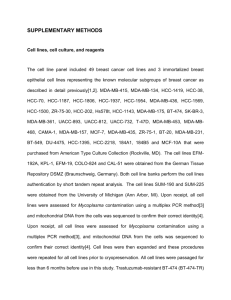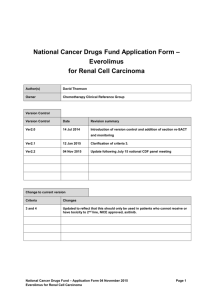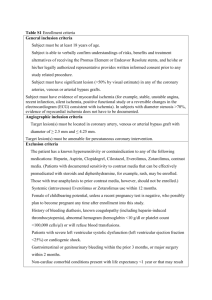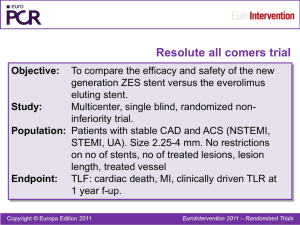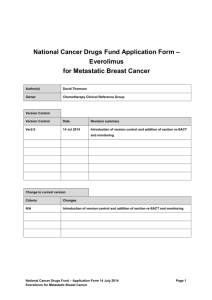Certican dispersible tablet ENG PL
advertisement
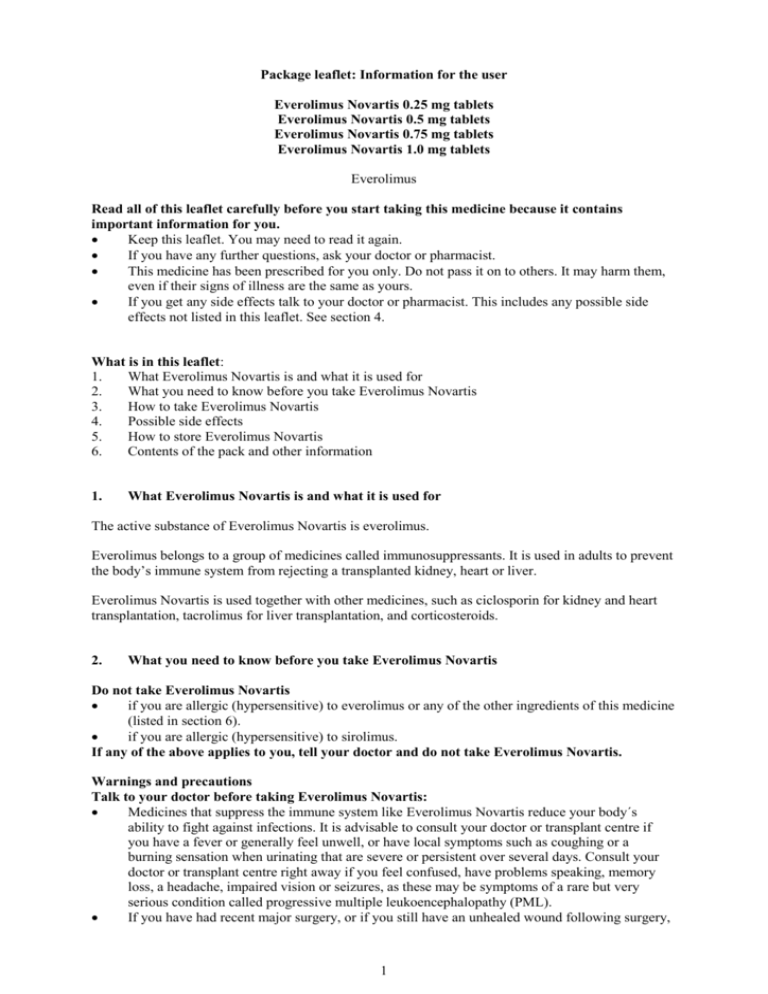
Package leaflet: Information for the user Everolimus Novartis 0.25 mg tablets Everolimus Novartis 0.5 mg tablets Everolimus Novartis 0.75 mg tablets Everolimus Novartis 1.0 mg tablets Everolimus Read all of this leaflet carefully before you start taking this medicine because it contains important information for you. Keep this leaflet. You may need to read it again. If you have any further questions, ask your doctor or pharmacist. This medicine has been prescribed for you only. Do not pass it on to others. It may harm them, even if their signs of illness are the same as yours. If you get any side effects talk to your doctor or pharmacist. This includes any possible side effects not listed in this leaflet. See section 4. What is in this leaflet: 1. What Everolimus Novartis is and what it is used for 2. What you need to know before you take Everolimus Novartis 3. How to take Everolimus Novartis 4. Possible side effects 5. How to store Everolimus Novartis 6. Contents of the pack and other information 1. What Everolimus Novartis is and what it is used for The active substance of Everolimus Novartis is everolimus. Everolimus belongs to a group of medicines called immunosuppressants. It is used in adults to prevent the body’s immune system from rejecting a transplanted kidney, heart or liver. Everolimus Novartis is used together with other medicines, such as ciclosporin for kidney and heart transplantation, tacrolimus for liver transplantation, and corticosteroids. 2. What you need to know before you take Everolimus Novartis Do not take Everolimus Novartis if you are allergic (hypersensitive) to everolimus or any of the other ingredients of this medicine (listed in section 6). if you are allergic (hypersensitive) to sirolimus. If any of the above applies to you, tell your doctor and do not take Everolimus Novartis. Warnings and precautions Talk to your doctor before taking Everolimus Novartis: Medicines that suppress the immune system like Everolimus Novartis reduce your body´s ability to fight against infections. It is advisable to consult your doctor or transplant centre if you have a fever or generally feel unwell, or have local symptoms such as coughing or a burning sensation when urinating that are severe or persistent over several days. Consult your doctor or transplant centre right away if you feel confused, have problems speaking, memory loss, a headache, impaired vision or seizures, as these may be symptoms of a rare but very serious condition called progressive multiple leukoencephalopathy (PML). If you have had recent major surgery, or if you still have an unhealed wound following surgery, 1 Everolimus Novartis may increase the risk of wound-healing problems. Medicines that suppress the immune system like Everolimus Novartis increase the risk of developing cancers, particularly of the skin and the lymphoid system. Therefore, you should limit your exposure to sunlight and UV light by wearing appropriate protective clothing and frequently applying a sunscreen with a high protection factor. Your doctor will monitor your kidney function, the amounts of fats (lipids) and sugar in your blood as well as the amount of proteins in your urine. If you have liver problems or have ever had a disease which may have affected your liver, please tell your doctor. Your doctor may need to modify the dose of Everolimus Novartis you are taking. If you experience respiratory symptoms (e.g. coughing, difficulty in breathing and wheezing), please inform your doctor. Your doctor may decide whether and how you need to continue Everolimus Novartis, and/or whether you need to receive other medicines to resolve this condition. Everolimus Novartis may reduce sperm production in men, thereby reducing the ability to father children. The effect is generally reversible. Male patients wanting to father children should discuss their treatment with their physician. Older people (65 years and over) There is limited experience with the administration of Everolimus Novartis in elderly people. Children and adolescents (younger than 18 years of age) Everolimus Novartis is not recommended for use in children and adolescents with a transplanted kidney because there is not enough experience in the use of Everolimus Novartis in this age group. Everolimus Novartis should not be used in children and adolescents with a transplanted liver. Other medicines and Everolimus Novartis Tell your doctor or pharmacist if you are taking or have recently taken or might take any other medicines, including medicines obtained without a prescription. Certain medicines may affect the way in which Everolimus Novartis works in the body. It is very important that you tell your doctor if you are taking any of the following medicines: immunosuppressive medicines other than ciclosporin, tacrolimus or corticosteroids. antibiotics, such as rifampicin, rifabutin, clarithromycin, erythromycin or telithromycin. antiviral medicines, such as ritonavir, efavirenz, nevirapine, nelfinavir, indinavir or amprenavir, which are used to treat HIV infection. medicines used to treat fungal infections, such as voriconazole, fluconazole, ketoconazole or itraconazole. medicines used to treat epilepsy, such as phenytoin, phenobarbital or carbamazepine. medicines used to treat high blood pressure or heart problems, such as verapamil, nicardipine or diltiazem. dronedarone, a medicine used to help regulate your heart beat. medicines used to lower blood cholesterol, such as atorvastatin, pravastatin or fibrates. medicines used to treat acute seizures, or used as a sedative before or during surgery or other medical procedures, such as midazolam. octreotide, a medicine used to treat acromegaly, a rare hormonal disorder that usually occurs in middle-aged adults. imatinib, a medicine used to inhibit the growth of abnormal cells. St. John’s wort (Hypericum perforatum), a herbal medicine used to treat depression. If you need to have a vaccination, talk to your doctor first. Everolimus Novartis with food and drink The presence of food can affect how much Everolimus Novartis is absorbed. In order to keep constant levels in your body, you should always take Everolimus Novartis in the same way. You should either always take it with food, or always on an empty stomach. 2 Do not take Everolimus Novartis with grapefruit juice or grapefruit. They affect how Everolimus Novartis works in the body. Pregnancy breast-feeding and fertility If you are pregnant, do not take Everolimus Novartis unless your doctor thinks it is absolutely necessary. If you are a woman and you could get pregnant, you should use an effective method of contraception during treatment with Everolimus Novartis and for 8 weeks after stopping treatment. If you think you may be pregnant, ask your doctor or pharmacist for advice before taking Everolimus Novartis. You should not breast-feed while taking Everolimus Novartis. It is not known whether Everolimus Novartis passes into breast milk. Everolimus Novartis may have an impact on male fertility. Driving and using machines No studies on the effects on the ability to drive and use machines have been performed. Everolimus Novartis contains Everolimus Novartis tablets contain lactose. If you do not tolerate certain sugars (glucose, galactose, lactose), you should talk to your doctor before taking Everolimus Novartis. 3. How to take Everolimus Novartis Your doctor will decide exactly what dose of Everolimus Novartis you should take and when you should take it. Always take Everolimus Novartis exactly as your doctor or pharmacist has told you. Check with your doctor or pharmacist if you are not sure. How much to take The usual starting dose is 1.5 mg/day in kidney and heart transplantation and 2.0 mg/day in liver transplantation. This is usually divided into two doses, one in the morning and one in the evening. How to take Everolimus Novartis Everolimus Novartis should only be taken by mouth. Do not crush the tablets. Swallow the tablets whole with a glass of water. You should take the first dose of this medicine as early as possible after kidney and heart transplantation and approximately four weeks after liver transplantation. You should take the tablets together with ciclosporin for microemulsion in kidney and heart transplantation, and with tacrolimus in liver transplantation. Do not switch from Everolimus Novartis tablets to Everolimus Novartis dispersible tablets without first telling your doctor. Monitoring during your treatment with Everolimus Novartis Your doctor may adjust your dose depending on how much Everolimus Novartis there is in your blood and depending on how well you respond to the treatment. Your doctor will perform regular blood tests to measure the amount of everolimus and ciclosporin in your blood. Your doctor will also carefully monitor your kidney function, blood lipids and blood sugar, as well as the amount of proteins in your urine. If you take more Everolimus Novartis than you should If you take more of this medicine than you should, talk to your doctor immediately. 3 If you forget to take Everolimus Novartis If you have forgotten to take your dose of Everolimus Novartis, take it as soon as you remember and then take the next dose at the usual time. Ask your doctor for advice. Do not take a double dose to make up for a forgotten tablet. If you stop taking Everolimus Novartis Do not stop taking the tablets unless your doctor tells you to. You will need to take this medicine for as long as you need to have immunosuppressants to prevent the rejection of your transplanted kidney, heart or liver. If you stop taking Everolimus Novartis, you will have a greater risk of your body rejecting the transplanted organ. If you have any further questions on the use of this medicine, ask your doctor or pharmacist. 4. Possible side effects Like all medicines, this medicine can cause side effects, although not everybody gets them. Because you take Everolimus Novartis together with other medicines, it is not always clear whether the side effects are caused by Everolimus Novartis or by the othermedicines. The following side effects need immediate medical attention: infections, inflammation of the lungs, allergic reactions, fever and bruising under the skin that may appear as red dots, with or without unexplained tiredness, confusion, yellowing of the skin or eyes, reduced urine output (thrombotic microangiopathy, haemolytic uraemic syndrome). Should you develop any of the following: persistent or worsening lung/breathing symptoms such as coughing, difficulty breathing, or wheezing, fever, generally feeling unwell, chest or abdominal pain, chills, burning sensation when urinating, swelling of face, lips, tongue or throat, difficulty swallowing, spontaneous bruising or bleeding for no obvious reason, rash, pain, unusual warmth, swelling or oozing from the site of surgery you should stop taking Everolimus Novartis and tell your doctor straight away. Other reported side effects include: Very common (may affect more than 1 in 10 patients) infections (viral, bacterial and fungal infections), lower respiratory tract infections, such as lung infections, including pneumonia upper respiratory tract infections, such as inflammation of the pharynx, and common cold, urinary tract infections, anaemia (reduced red blood cell count), low levels of white blood cells, leading to a higher risk of infection, reduced blood platelet count, which can lead to bleeding and/or bruising underneath the skin, high level of fats (lipids, cholesterol and triglycerides) in the blood, onset of diabetes (high level of sugar in the blood), 4 reduced level of potassium in the blood, anxiety, problems falling asleep (insomnia), headache, fluid collection in the sac around the heart, which if severe, can decrease the heart's ability to pump blood, high blood pressure, venous thrombosis (blockage of a major vein by a blood clot), fluid collection on the lungs and in the chest cavity, which, if severe, could make you breathless, coughing, breathlessness, diarrhoea, feeling sick (nausea), being sick (vomiting), stomach (abdominal) pain, general pain, fever. accumulation of fluid in the tissues, abnormal wound healing, Common (may affect up to 1 in 10 patients) blood poisoning, wound infection, cancers and benign tumours, skin cancer, kidney damage with low blood platelets and low red blood cell counts, with or without a rash (thrombocytopenic purpura/haemolytic uraemic syndrome), breakdown of red blood cells, low levels of red blood cells and platelets, fast heart beat, nose bleeds, reduced numbers of blood cells (symptoms may include weakness, bruising and frequent infections), clotting in the blood vessels of the kidney, which may result in graft loss mostly within the first 30 days after kidney transplantation, bleeding disorders, cyst containing lymph fluid, pain in the mouth or throat, inflammation of the pancreas, mouth sores, acne, hives (urticaria) and other allergic symptoms, such as swelling of the face or throat (angiooedema), rash, joint pain, muscle pain, protein in the urine, kidney disorders, impotence, hernia at the site of surgery, abnormal liver test results, Uncommon (may affect upto 1 in 100 patients): cancer of the lymph tissue (lymphoma/post-transplant lymphoproliferative disorder), 5 low levels of testosterone, inflammation of the lungs, inflammation of the liver, jaundice, Other side effects: Other side effects have occurred in a small number of people, but their exact frequency is unknown: abnormal accumulation of protein in the lungs (symptoms may include persistent dry cough, fatigue and difficulty breathing), inflammation of blood vessels, severe rash with skin swelling. If you have concerns regarding any of these effects, tell your doctor. There may also be side effects of which you are not aware, such as abnormal results of laboratory tests, including tests of kidney function. This means that your doctor will perform blood tests to monitor any changes to your kidneys during your treatment with Everolimus Novartis. Reporting of side effects If you get any side effects, talk to your doctor or pharmacist. This includes any possible side effects not listed in this leaflet. You can also report side effects directly via the national reporting system listed in Appendix V. By reporting side effects you can help provide more information on the safety of this medicine. 5. How to store Everolimus Novartis Keep Everolimus Novartis out of the sight and reach of children. Do not use Everolimus Novartis after the expiry date which is stated on the carton after EXP. The expiry date refers to the last day of that month. Store the blister packs in the original carton in order to protect from light and moisture. Do not use any Everolimus Novartis pack that is damaged or shows signs of tampering. Do not throw away any medicines via wastewater or household waste. Ask your pharmacist how to throw away medicines you no longer use. These measures will help to protect the environment. 6. Content of the pack and other information What Everolimus Novartis contains The active substance is everolimus. Each tablet contains 0.25, 0.5, 0.75 or 1.0 mg everolimus. The other ingredients are: - Everolimus Novartis 0.25 mg tablets: butylhydroxytoluene (E321), magnesium stearate, lactose monohydrate (2 mg), hypromellose, crospovidone and anhydrous lactose (51 mg). - Everolimus Novartis 0.5 mg tablets: butylhydroxytoluene (E321), magnesium stearate, lactose monohydrate (4 mg), hypromellose, crospovidone and anhydrous lactose (74 mg). - Everolimus Novartis 0.75 mg tablets: butylhydroxytoluene (E321), magnesium stearate, lactose monohydrate (7 mg), hypromellose, crospovidone and anhydrous lactose (112 mg). - Everolimus Novartis 1.0 mg tablets: butylhydroxytoluene (E321), magnesium stearate, lactose monohydrate (9 mg), hypromellose, crospovidone and anhydrous lactose (149 mg). What Everolimus Novartis looks like and contents of the pack Everolimus Novartis 0.25 mg tablets are white to yellowish, marbled, round, flat tablets of 6 mm, engraved “C” on one side and “NVR” on the other. Everolimus Novartis 0.5 mg tablets are white to yellowish, marbled, round, flat tablets of 7mm, engraved “CH” on one side and “NVR” on the other. 6 Everolimus Novartis 0.75 mg tablets are white to yellowish, marbled, round, flat tablets of 8.5 mm, engraved “CL” on one side and “NVR” on the other. Everolimus Novartis 1.0 mg tablets are white to yellowish, marbled, round, flat tablets of 9 mm, engraved “CU” on one side and “NVR” on the other. Everolimus Novartis tablets are supplied in packs containing 50, 60, 100 or 250 tablets. Not all pack sizes may be marketed. Everolimus Novartis is also available in the form of dispersible tablets. Marketing Authorisation Holder and Manufacturer To be completed nationally In Sweden: Novartis Sverige AB Box 1150 183 11 Täby +46 8 732 32 00 This medicinal product is authorised in the Member States of the EEA under the following names: Germany Everolimus Novartis Sweden Everolimus Novartis This leaflet was last revised in 2016-01-20 7
